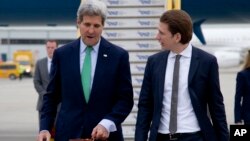U.S. Secretary of State John Kerry and Iranian Foreign Minister Javad Zarif met Wednesday in Vienna for talks on international efforts to limit Iran’s nuclear program.
Kerry and Zarif were joined by European Union representative Catherine Ashton, who has been leading efforts by Germany, Russia, Britain, France, China and the United States to convince Iran to roll back its nuclear program in exchange for the lifting of some economic sanctions.
After more than six hours of talks, a senior State Department official said they are “deliberately working through the technical issues” in “very intense, very focused, very concrete” efforts to reach an agreement by next month’s deadline.
“We have not discussed an extension because we believe in keeping the pressure on,” the official said, but we “know enough about negotiations to never say never.”
In a televised address late Monday, Iranian President Hassan Rouhani said a settlement “can be achieved” in the next five weeks.
“Step by step,” Secretary Kerry said at the start of Wednesday’s talks.
Among the significant gaps that remain are questions of how much uranium Iran will be allowed to enrich to what level of purity. That would determine how long it would take Iran to develop a nuclear weapon should it decide to do so.
A senior U.S. diplomat says Iran and six world powers still aim to meet a self-imposed Nov. 24 deadline to end a decade-old nuclear standoff, although both Tehran and Moscow have indicated that more time may be required.
Iran has long said its nuclear program is for peaceful civilian purposes, and it does not intend to build atomic weapons. U.S. and European leaders believe Tehran has engaged in a covert program, however, to build such devices.
The senior State Department official said, “What these negotiations are about is whether Iran is willing to take verifiable actions to show that their program is for peaceful purposes,” and the Obama administration is hopeful that Iran will decide to take advantage of this “historic opportunity.”
Zarif and Ashton remained in Vienna for talks Thursday with political directors from the six countries negotiating this deal. It is there they are expected to decide how best to move forward in the next five weeks.




